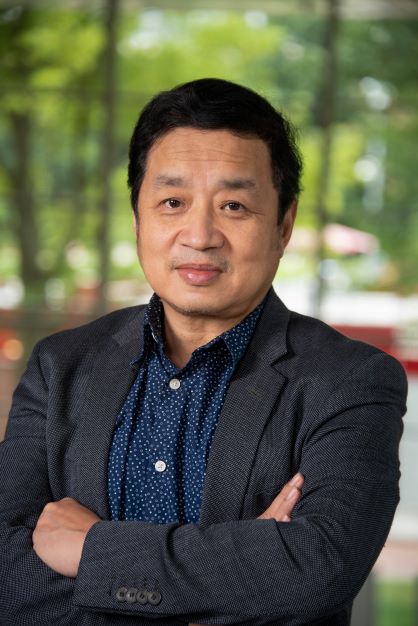Congress Keynotes
Jie Wu, Temple University

Jie Wu is Laura H. Carnell Professor at Temple University and the Director of the Center for Networked Computing (CNC). He served as Chair of the Department of Computer and Information Sciences from the summer of 2009 to the summer of 2016 and Associate Vice Provost for International Affairs from the fall of 2015 to the summer of 2017. Prior to joining Temple University, he was a program director at the National Science Foundation and was a distinguished professor at Florida Atlantic University, where he received his Ph.D. in 1989. His current research interests include mobile computing and wireless networks, routing protocols, network trust and security, distributed algorithms, applied machine learning, and cloud computing. Dr. Wu regularly published in scholarly journals, conference proceedings, and books. He serves on several editorial boards, including IEEE Transactions on Service Computing, IEEE/ACM Transactions on Networking, and Journal of Computer Science and Technology. Dr. Wu is/was general chair/co-chair for IEEE DCOSS’09, IEEE ICDCS’13, ICPP’16, IEEE CNS’16, WiOpt’21, ICDCN’22, IEEE IPDPS’23, ACM MobiHoc’23, and IEEE CCGrid 2024 as well as program chair/cochair for IEEE MASS’04, IEEE INFOCOM’11, CCF CNCC’13, and ICCCN’20. He was an IEEE Computer Society Distinguished Visitor, ACM Distinguished Speaker, and chair for the IEEE Technical Committee on Distributed Processing (TCDP). Dr. Wu is a Fellow of the AAAS and a Fellow of the IEEE. He is the recipient of the 2011 China Computer Federation (CCF) Overseas Outstanding Achievement Award. He is a Member of the Academia Europaea (MAE).
Scalability and Liquidation Enhancement in QoS Lightning Networks
Abstract: The lightning network (LN) is a special network in Bitcoin that uses offchain micropayment channels to scale the blockchain’s capability to perform instant transactions without a global block confirmation process. However, micropayment scalability in a large LN and liquidation for small nodes still remain major challenges for the LN. In this paper, we introduce the notion of supernodes and the corresponding supernodes-based pooling to address these challenges. In order to meet the high adaptivity and low maintenance cost in the dynamic LN where users join and leave, supernodes are constructed locally without any global information or label propagation. Each supernode, together with a subset of (non-supernodes) neighbors, forms a supernode-based pool. These pools constitute a partition of the LN. Additionally, supernodes are self-connected. Micropayment scalability is supported through node set reduction as only supernodes are involved in searching and in payment with other supernodes. Liquidation is enhanced through pooling to redistribute funds within a pool to external channels of its supernode. Simulations have been conducted to validate the improvement in routing scalability and liquidation of the proposed architecture under different settings.
Jiannong Cao, Hong Kong Polytechnic University

Dr. Cao is the Otto Poon Charitable Foundation Professor in Data Science, the Chair Professor of Distributed and Mobile Computing and the director of Internet and Mobile Computing Lab in the Department of Computing at The Hong Kong Polytechnic University. He served the department head from 2011 to 2017. Dr. Cao is also the Dean of Graduate School, director of Research Institute for AIoT, and director of Research Facility in Big Data Analytics at Hong Kong Polytechnic University. Dr. Cao’s research interests include edge computing and distributed systems, wireless sensing and networking, big data and AI. He published 6 co-authored and 9 co-edited books, and over 500 papers in major international journals and conference proceedings. He also obtained 13 patents. He received many awards for his outstanding research achievements. Dr. Cao served the Chair of the Technical Committee on Distributed Computing of IEEE Computer Society 2012-2014. He is a member of Academia Europaea, a fellow of HK Academy of Engineering Sciences, a fellow of IEEE, a fellow of CCF and a distinguished member of ACM. In 2017, he received the Overseas Outstanding Contribution Award from China Computer Federation.
Decentralized Computing and AI Infrastructure for Web3
Abstract: Web 3.0 is built on decentralized computing and data infrastructures leveraging blockchain, smart contracts, virtual assets and other advanced technologies and applications. This talk introduces our recent research and development of decentralized computing and AI infrastructure poised to revolutionize the way we develop, deploy, and utilize large AI models. I will present a collaborative edge intelligence (CEAI) platform designed to harness the power of decentralized computing with a programming model to facilitate the development and deployment of edge-native contemporary AI applications. The web3 platform connects users, model developers, and device vendors of large AI models, forming an ecosystem. By decentralizing the computational resources required for large AI models, we enable more efficient, scalable, and cost-effective AI solutions. This ecosystem not only democratizes access to high-performance computing but also fosters innovation and collaboration across the AI community. I will also discuss the transformative impact of a web3-based open computing and AI ecosystem, highlighting real-world applications and future directions.
Co-sponsored by




